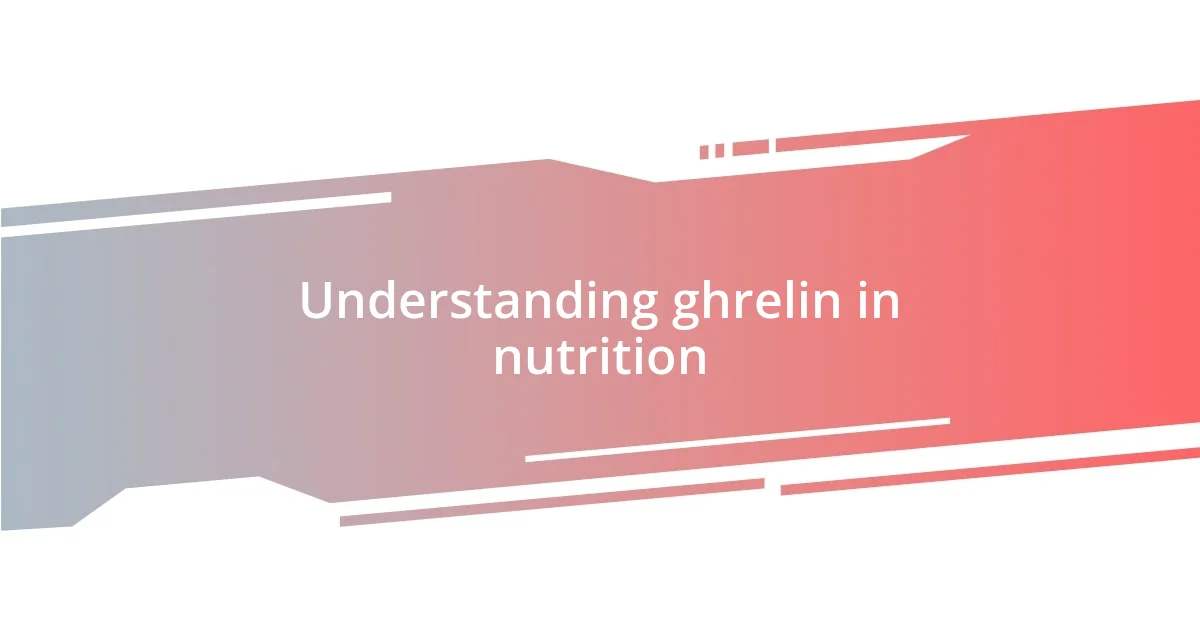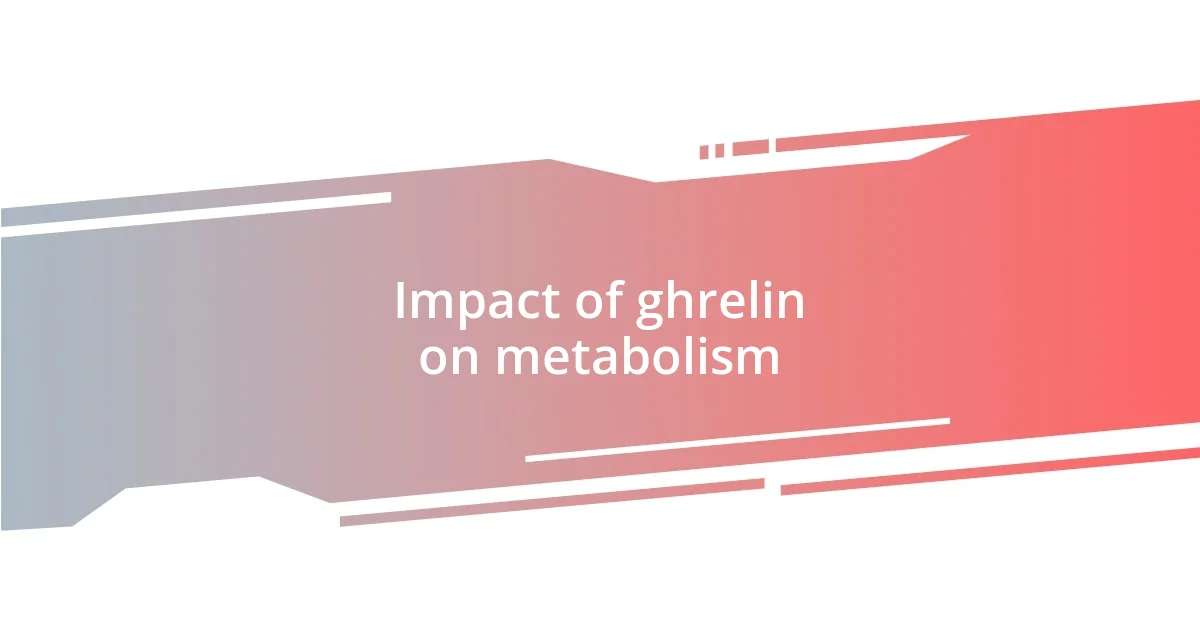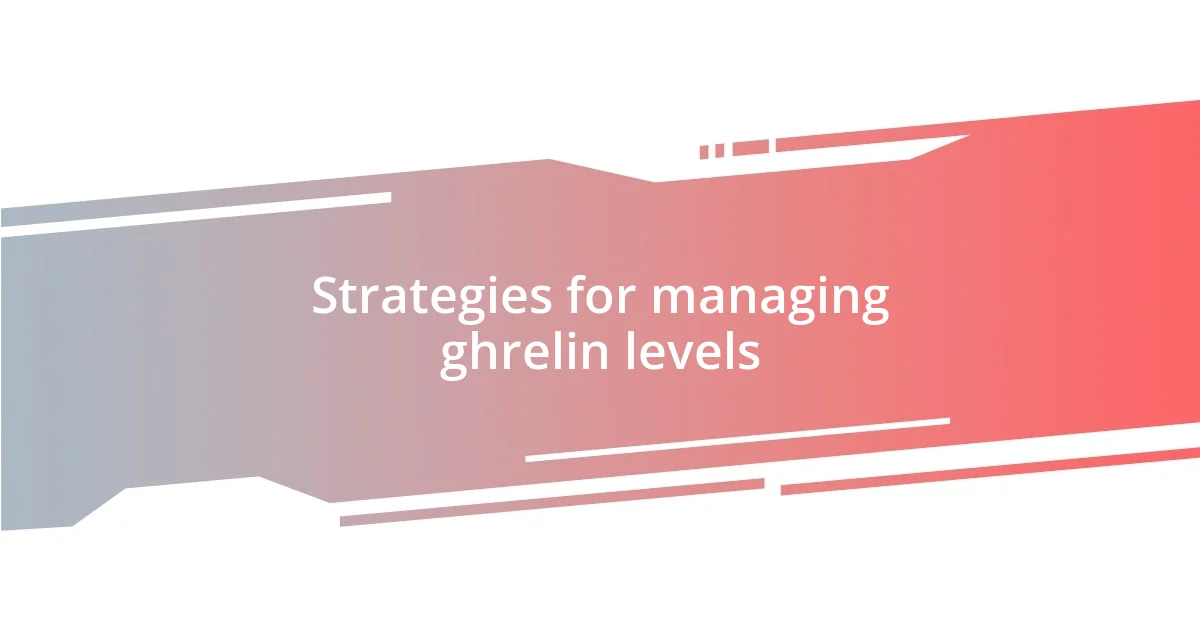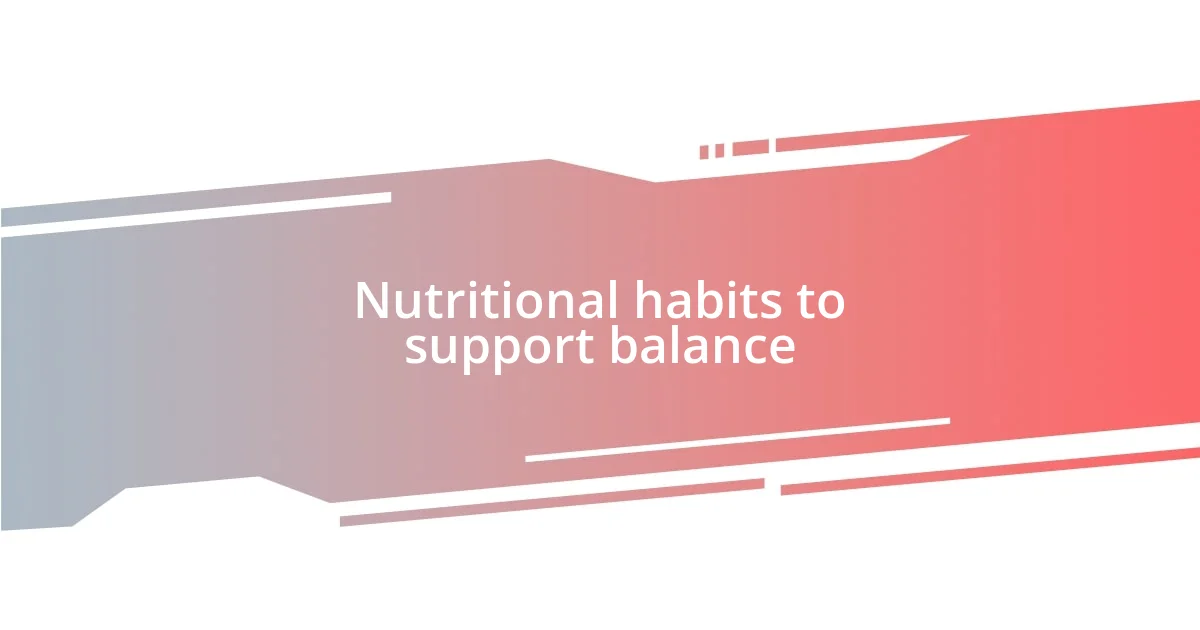Key takeaways:
- Ghrelin, known as the “hunger hormone,” regulates appetite and food intake, with levels rising before meals and decreasing post-eating.
- Managing ghrelin levels through consistent meal timing, incorporating protein-rich foods, and reducing stress can lead to better appetite control and healthier food choices.
- Mindful eating, focusing on whole foods, and staying hydrated support balanced ghrelin levels, helping to differentiate between true hunger and cravings.

Understanding ghrelin in nutrition
Ghrelin, often dubbed the “hunger hormone,” plays a crucial role in regulating our appetite and food intake. From my own experience, I’ve noticed that during periods of stress, my ghrelin levels seem to spike, leading me to crave comfort foods. Isn’t it fascinating how our bodies communicate with us in ways we might not even realize?
When we eat, our stomach stretches, which signals the brain to suppress ghrelin production. I remember a time when I truly focused on mindful eating; it was eye-opening. By taking time to savor each bite, I noticed that I felt satisfied with less food. This connection emphasizes how awareness and nutrition intertwine in managing our hunger.
Moreover, research shows that ghrelin levels tend to increase before meals and drop after eating. I often wonder how different types of food impact these levels. For instance, have you ever noticed how protein-rich meals can keep you full longer? It seems like a simple tip, yet it profoundly affects how we approach our nutrition and hunger cues.

Role of ghrelin in appetite
When it comes to appetite regulation, ghrelin plays a significant role in signaling hunger. I find it interesting how my body often sends me mixed signals. For example, during late-night studying sessions, I sometimes feel that familiar gnawing hunger, urging me to snack. It’s like my body knows I need energy for focus, yet I suspect it’s also an emotional response, stemming from fatigue or stress rather than true hunger.
- Ghrelin levels are typically highest before meals, which drives our desire to eat.
- Eating triggers the stomach to signal to the brain, reducing ghrelin production post-meal.
- I’ve noticed that when I skip breakfast, my ghrelin levels spike, leading me to overindulge later in the day.
- The type of food matters—carbohydrates can result in a quicker rise and fall of ghrelin, while proteins tend to offer more prolonged satiety.
- I sometimes experiment with high-protein snacks, and I genuinely notice a difference in how full I feel over the next few hours.
Ghrelin’s influence on our appetite highlights the delicate balance our body maintains. It’s intriguing to pay attention to that relationship—really tuning into how I feel can lead to healthier choices and a better understanding of my own eating habits.

Impact of ghrelin on metabolism
Ghrelin significantly impacts metabolism by influencing how our bodies utilize energy. When I think back to times when I’ve restricted my calorie intake, I noticed that my energy levels would drop. This is likely due to a rise in ghrelin, which can prompt the body to conserve energy instead of burning it. Isn’t it curious how our metabolism adjusts so dynamically to our eating habits?
Additionally, ghrelin may affect fat storage. I remember a period when I was trying to lose weight, yet my body felt like it was holding onto fat no matter what. This was likely because ghrelin can promote fat accumulation, especially when we’re under stress. It’s a reminder of how interconnected our hormones and metabolism really are, don’t you think?
The timing of meals also plays a crucial role in ghrelin’s impact on metabolism. I’ve often noticed that when I eat regularly, my energy seems more stable throughout the day. Conversely, inconsistent eating patterns spike my ghrelin levels and leave me feeling sluggish. This makes sense; a well-timed meal can keep ghrelin in check, maintaining a healthier metabolic rate.
| Impact of Ghrelin | Effects on Metabolism |
|---|---|
| Energy Utilization | Promotes energy conservation during low intake |
| Fat Storage | May encourage fat accumulation under stress |
| Meal Timing | Consistent meals help regulate ghrelin and energy levels |

Ghrelin’s relationship with food choices
Ghrelin doesn’t just influence when we eat; it also plays a pivotal role in what we choose to eat. I often find that on days when my ghrelin levels are high, my cravings shift towards more calorie-dense foods, like pizza or chocolate. It’s as if my body is whispering, “Satisfy that hunger with something indulgent!” This instinctive response makes it essential to recognize the power of this hormone in our eating decisions.
Interestingly, my experience suggests that the more aware I become of my ghrelin-driven cravings, the better I can navigate my food choices. For instance, when I feel that intense urge to snack, I pause and reflect. Rather than heading straight for the chips, I might opt for a handful of nuts or a piece of fruit instead. This small shift not only helps me manage my weight but also creates a sense of empowerment over my choices. Isn’t it fascinating how that moment of awareness can lead to better outcomes?
Moreover, I’ve noticed that stress amplifies my ghrelin levels, which can lead to choices I later regret. Just last month, during a particularly hectic week, I found myself reaching for sugary treats instead of nourishing meals. I realized that my heightened ghrelin levels were steering my food choices toward quick satisfaction rather than long-term wellness. This makes me wonder—how many of us fall into this pattern without realizing it? Recognizing the emotional roots of our food choices can be a game changer in establishing healthier habits.

Strategies for managing ghrelin levels
One effective strategy I’ve discovered for managing ghrelin levels is regular meal timing. I remember a time when my work schedule made it easy to skip meals or eat at odd hours. During those periods, I felt ravenous, and my ghrelin would surge, driving my cravings into overdrive. Now I stick to a routine; having breakfast, lunch, and dinner around the same times daily has drastically improved my appetite control. Have you ever noticed how predictable meal times can anchor your hunger?
Incorporating protein into meals is another game-changer. While experimenting with different diets, I realized that meals rich in protein kept me full longer than carb-heavy options. Picture this: after a satisfying omelet or a salmon salad, I find I can resist unnecessary snacking much more easily. The stabilizing effects of protein on ghrelin levels are substantial; it makes me feel more balanced and in control. Isn’t it amazing how something as simple as choosing a protein-packed meal can make such a difference?
Lastly, I’ve learned that managing stress is crucial for keeping ghrelin levels in check. There was a time when a chaotic lifestyle led to emotional eating, driven by spikes in ghrelin. To combat this, I’ve started practicing mindfulness techniques like deep breathing and meditation. I can’t express how grounding it feels to take a moment to breathe before I reach for a snack. This practice not only reduces my stress levels but also allows me to better evaluate my hunger and cravings. How often do we let stress dictate our eating habits without even realizing it?

Nutritional habits to support balance
Adopting mindful eating habits has been transformative for me. I recall one evening when I rushed through dinner, barely tasting my food. This lack of attention led me to feel hungry soon after, triggering a ghrelin surge that made me reach for snacks too quickly. Now, I consciously slow down during meals, savoring each bite. This simple shift not only enhances my enjoyment but also fosters a natural feeling of fullness that keeps overeating at bay.
I’ve also found that incorporating whole foods into my daily meals makes a big difference. When I fill my plate with colorful fruits and vegetables, I feel energized and less likely to crave unhealthy options. Just last week, I made a vibrant stir-fry packed with veggies and some chickpeas. The delightful flavors kept me satisfied and minimized those ghrelin-driven cravings for quick fixes. Have you ever experienced how a meal bursting with freshness can differ from those hollow calorie bombs we sometimes reach for?
Lastly, I’ve embraced the power of hydration as a way to support balanced ghrelin levels. I remember periods when I mistook dehydration for hunger—oh, the confusion! Now, I make it a point to drink water throughout the day, and I notice that it helps me differentiate between true hunger and thirst. Carrying a water bottle has become part of my routine. Isn’t it intriguing how often we overlook such a simple habit that can significantly influence our cravings?














